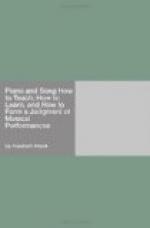Critics have often asked, Why does Jenny Lind sing so coolly? why does she not sing grand, passionate parts? why does she not select for her performances some of the later German or even Italian operas? why does she always sing Amina, Lucia, Norma, Susanna, &c.? In reply to these and similar questions, I will ask, Why does she wish always to remain Jenny Lind? why does she endeavor to preserve her voice as long as possible? why does she select operas in which she may use her pure, artistic, refined mode of singing, which permits no mannerism, no hypocritical sentiment, and which possesses an ideal beauty? why does she choose operas in which she can give the most perfect possible image of her own personality? why operas in which she may allow the marvellous union of her powers of song to shine conspicuously, without doing violence to her voice and forcing its tones, or casting doubt upon her lofty, noble, and beautiful art? why does she first regard the singing, and only afterwards the music, or both united? This is the answer to the same questions which are likewise asked about Henrietta Sontag and all great singers. Even the passionate Schroeder-Devrient seldom made an exception to this rule, although she was not independent of the theatres.
These questions should be an urgent warning to our young female singers not to sacrifice themselves to any of the modern screaming operas, unsuited for singing; but to preserve and watch over their voices, and to guard them from immoderate, continued, and often inartistic exertion; in fact, to sing always in the voice-register with which nature has endowed them, and never to shriek; to renounce the present, fashionable, so-called “singing effects,” and the modern scene-screaming, as Jenny Lind and Henrietta Sontag have always done. Then their voices would remain useful for the opera, as was formerly the case, from ten to twenty years; and they would not have to mourn, as is too common, after a very short time, a feeble, broken voice and departed health.
Let Jenny Lind and Henrietta Sontag be placed as the finest models before our young, gifted, ambitious singers. They are to be regarded as miraculous phenomena; especially in our times, when the modern style of singing has, for reasons difficult to justify, so widely deviated from the old school which was so fruitful in brilliant results,—that of Pistocchi, Porpora, and Bernacchi. What could show more clearly the destructiveness of our present opera style than the sublime beauty of their singing, combined with their noble, refined, sound voices, such as may perhaps still be found among you?
* * * * *
The managers of our theatres are in want of tenor singers who can act. They should consider that tenors who have any voices left have never learned to act, and tenors who are able to act no longer have any voices; because, as a rule, they either have studied too little, or have studied erroneously. Unless the voice has received a correct and fine culture, the German comic operas lead immediately to destruction of the voice, especially of the sensitive, easily injured German tenor voice.




